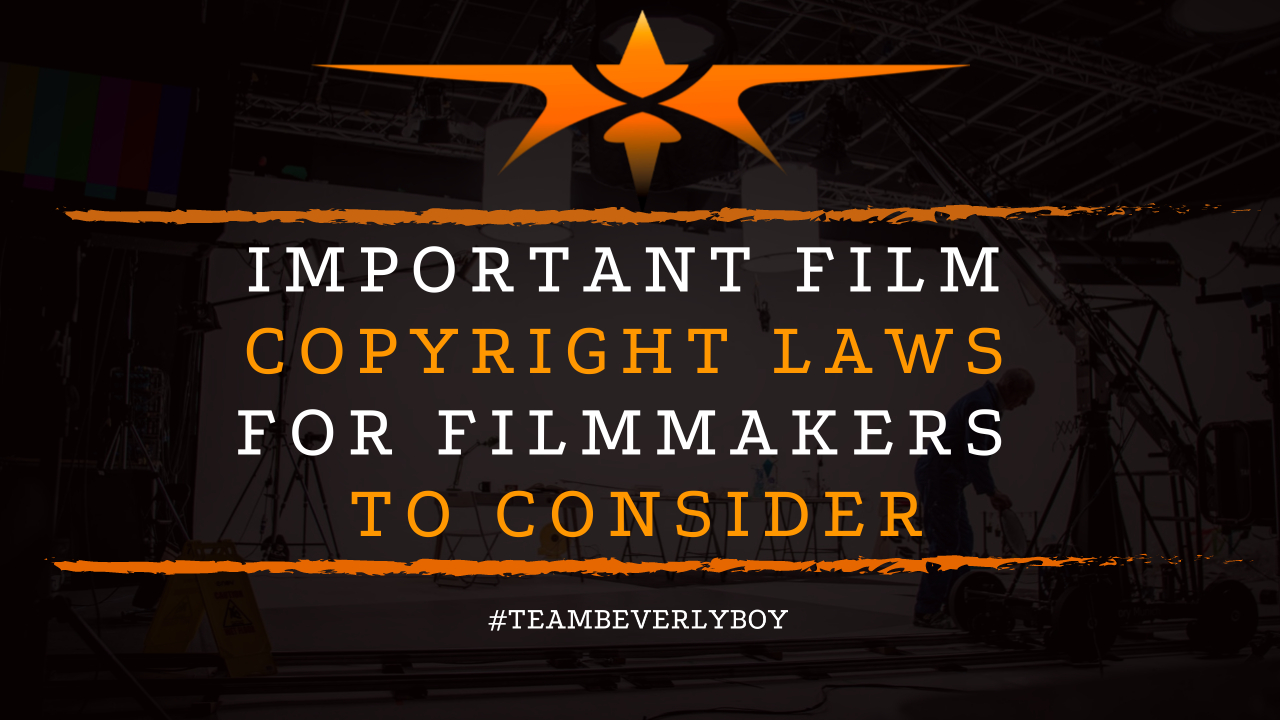
Important Film Copyright Laws for Filmmakers to Consider
Filmmakers that are interested in producing a motion picture are protected by film copyright laws which represent a series of exclusive rights that are granted to their works. Like other forms of literary protections and rights, film copyright laws for filmmakers represent a key area of consideration in advancing a film project forward through the various channels of production and due process.

To help you understand your rights as a filmmaker? We’ve put together this go-to guide on film copyright laws. And what it means to produce a motion picture that is copyright protected.
Filmmakers Get Exclusive Rights
Filmmakers are protected by a series of exclusive rights that provide protection for their works. Motion pictures are protected by the American copyright law and have been since 1912.
Under Copyright law, filmmakers have the right to make copies and to control public performances of the works they create. Further, filmmakers are not required to register a copyright in order to obtain protection under Copyright Law.
However, a copyright infringement lawsuit may not be filed on any works that are not registered. Therefore it’s best for filmmakers to seek protection. In order to prevent others from using the work and infringing.
Copyrights for Screenplays
Filmmakers that create an original screenplay or an adapted screenplay may seek protection to prevent others from infringing upon their works. U.S. Copyright law provides certain protections for screenwriters and the derivative works that come from a screenplay.
When a screenplay is produced from a derivative work, such as resulting from a children’s book or novel, or from a previously written poem, song or other work. A copyright license is required in advance of creating the work.
Public Domain
Screenplays that are derived from public domain works, such as those which are derived from Mark Twain novels. Or Shakespeare’s plays will not require copyright licensing permission.
Ideas are also not protected by copyright. So for screenwriters that have developed a strong opinion. Or idea to create a screenplay but have not yet produced the work.
We recommend that you prepare the work into a film treatment. Or begin to outline the idea more fully. And apply for copyright before sharing with others for your own protection and the protection of your literary works.
While the idea itself cannot be copyrighted, the idea that has been fleshed out into a full treatment or the outline of a screenplay will qualify.
Seeking Copyright License
Are you a filmmaker that is interested in creating a derivative work from a copyrighted document or work? As a filmmaker, if you wish to produce a movie or video that is created as a result of a derivative work.
Such as a novel, past movie, screenplay, or other copyrighted document you will need to seek a copyright license in order to do so.
Find the Owner
Applying for the license rights to use copyrighted works, you’ll have to start by finding the copyright owner.
A search of the U.S. Copyright office is a good starting point in finding the original copyright owner.
Once you’ve figured out who owns the rights to the works you wish to use, you’ll need to request permission.
Rights Vary
When requesting permission to use copyrighted works, film copyright laws do not specify exactly what is or is not required. But the copyright owner will likely want to know what you wish to use, why you wish to use it, and how it will be used.
They’ll also need to know what kind of rights to grant you. This depends on what you intend to do. License rights vary, so make sure you’re familiar with the individual needs and what each means for your project.
Types of Copyright License

User license rights are available in a number of different types that are based on the methods of use for which you intend to include copyrighted works in your own productions.
An open license preserves the main freedom of the original copyright owner and adds reasonable restrictions.
The following licenses are available:
- Copy license – allows for the work to be copied in its original form.
- License to modify – allows the work to be changed before being used.
- Derivative work license – allows the work to be used to produce new work.
- Distribution license – allows the work to be distributed.
- Redistribute license – allows the work and license to be distributed from the original owner.
- Share alike – provides permission to distribute derivative works under the same license.
- Credit or attribution – identifies the original copyright owner.
- Copyright notice – provides a written symbol of ownership of copyright.
- All rights reserved – declares that there are no usage rights.
- Warranty – implies that there is (or usually is not) a warranty with the license.
Get the Appropriate License
Before you apply for a license to use copyrighted work, make sure that you are familiar with the usage licenses and what each of them mean. This way you can request the appropriate license for your use of the copyrighted material or literary work.
Fair Use of Copyright Protected Works
Filmmakers must also be familiar with film copyright laws that apply under the “fair use” defense. Fair use is a common defense that arises in the production of documentaries and similar styles of films.
Under Fair Use, filmmakers are generally allowed to use copyrighted materials in certain circumstances that apply specifically to the filmmaker and the methods in which the works are used.
For example
Fair use implies that documentary filmmakers can use copyrighted material as long as it is done so in a completely different work from what was originally produced and copyrighted.
And if it is done for the purpose of creating a creative work that is meant to educate or otherwise inform.
However, it’s important for filmmakers to also understand that fair use is interpreted on a case-by-case basis.
By each individual judge that presides over the lawsuits which are brought forth for copyright infringement.
What it Means
What this means is that, film copyright laws provide protections for documentary filmmakers. Provided that they have only used copyrighted materials under very specific circumstances.
And that they have taken the appropriate steps to seek permission if doing so could have prevented a case from arising.
Furthermore, because fair use is a defense to copyright infringement, in order for a documentary filmmaker to use this protection they must have first been served with a lawsuit from U.S. copyright infringement.
The Takeaway
To prevent yourself from facing legal challenges related to copyright infringement and other serious circumstances, consider seeking permission to use copyrighted material in advance of the production if you can as this is the best defense to a civil lawsuit.
As you can see, film copyright laws for filmmakers provide various protections and regulations that can help you in using various copyrighted works to your advantage as well as to protect your own works by a copyright to prevent infringement.
As a filmmaker, you should take some time to familiarize yourself with the laws and protections afforded to you.



